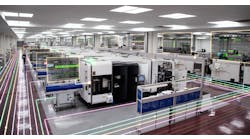Technological advances have provided manufacturers with solutions to accelerate business planning with more precision than ever. The rise of robotics and AI-based solutions has streamlined manufacturing processes from the production line to the last mile of delivery. But speed is not always a good thing. Errors can arise when there is speed without accuracy, especially if your systems are based on manual input. Automation can alleviate the burden of human error when you have the right systems in place. Acceleration, coupled with the right tools, can bring more accuracy into your workflow.
The top challenges for manufacturers
Geopolitical tensions, talent shortages, the global pandemic and globalization issues have brought about severe supply chain disruption in the past few years. Future-proofing the industry requires smart solutions to further advance production cycles and on-time delivery.
In the United States, the manufacturing industry has been hit the hardest with the largest surge of workers leaving their jobs than any other sector – a 60 percent increase of resignations since pre-pandemic times.
Two significant trends have emerged to address these challenges head on: reshoring production to more local areas, to offset talent shortages and provide shorter delivery routes; and accelerated use of digital technologies that help manufacturers quickly respond to drastic market changes. Predictive analytics can support forecasting to navigate these uncertain times.
Why precision planning matters
From an executive perspective, decisions based on accurate, real-time data can be accelerated by leveraging widespread expertise in Excel to design, implement, and explain large-scale forecasting and planning initiatives efficiently. Applying flexible modeling is critical, as it enables you to configure turnkey solutions for finance, sales, and workforce planning while adapting models quickly as your business scales and augment human decisions with machine learning predictions. Ultimately, the result will be more control over your data in a secure, highly scalable, environment with integrations to your existing business systems to expedite workflows with ease.
AI-based solutions can create what-if analyses in minutes, with a responsive, highly scalable planning platform. With the ability to access historical data and apply AI-assisted planning to augment human decisions with precise machine learning predictions, executives can make laser-like decisions based on actuals … instead of outdated data strewn across the enterprise. Let’s look at one manufacturing example.
The case of Heiniger
Heiniger, a metalworking operation that manufactures high-quality shearing equipment, faced a challenge in its sales planning due to scattered data and cumbersome manual, repetitive processes. In the span of two months, Heiniger implemented a mobile-based, data integration solution that both digitized its sales planning efforts as well as allowed multiple departments to perform self-service analysis, with instant mobile access to customer data any time of day or night.
The automated system along with its easy accessibility saved the company’s analysis team more than two hours each week while providing a measurable improvement in their sales planning. The result has been a seamless sales planning process that greatly reduced time-intensive tasks while supporting improved business performance.
The case of Dystar
Another example is Dystar, a manufacturer of textile dyes and products and services for textile production. With offices, competency centers, agencies and production plants in over 50 countries, it had an increasing need to automate its processes, as its Excel-based reporting and planning systems could not keep pace with global demands. Dealing with over 80 currencies, Dystar could not process the volume of data incoming data from around the world fast enough. The controlling office looked to a unified solution for planning, analysis, and forecasting that would allow for instant global consolidations across all currencies.
The solution allowed for Web-based data capture, the capacity for a real-time drill-down broken down into product groups and business units from anywhere in the world, along with unified planning with powerful online simulations and scenarios. The result has been improved data management and governance – and Dystar now enjoys high-quality data integrity, security, and faster response times: precision at its best.
What AI can do
Artificial Intelligence has a number of benefits for planning, budgeting, and forecasting processes based on high-quality data management. It augments data preparation by ensuring source data is clean, drawing from multiple areas to provide a single source of truth. It can also help remove outliers and fill in gaps with its AI-augmented data preparation function. In addition, it can automate forecasting with advanced predictive technology for transparent results featuring best- and worst-case scenarios. It also can use various models to account for seasonality, cycles, and trends. Furthermore, AI provides intelligent recommendations, for instance when the goal is to reduce customer churn, gain new insights for the salesforce, or improve demand planning.
Given the challenges that manufacturers currently face, leaving the grunt work to machines can vastly improve business performance, free up time for more valuable strategic tasks, and add overall value to an enterprise by accelerating decision making with precision. Automation does not unequivocally endanger job security, but rather enhances the ability to get the job done.
Tim Caudill is director of Solution Advisory at Jedox Inc., and has over two decades of domain expertise mostly focusing on financial software implementation and corporate finance teams.






